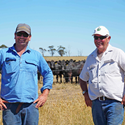Purchased in 1906, Boorook Farm in southern Victoria has been the home and business of the Allen family for four generations. Today, sustainability has been placed at the forefront of the farm’s management plan to protect the land, and the business, for many more generations to come.
In 1976 David took over the running of the farm from his father and now shares business responsibility with his son Nick. A family business, both David and Nick live on the farm with their families with the hope that, in time, Nick’s children will be the fifth generation to take on the running of the 4,760-acre farm. To enhance the farm for future generations, David and Nick have put a strong emphasis on succession planning and sustainable practices that will allow the business to thrive. By implementing rotational grazing practices as well as a range of water and energy-conserving initiatives, the Allens are creating a resilient business which will be around for centuries to come.
Key areas of sustainable practice
The farm regularly experiences the effects of a changing climate, from variable, unpredictable rainfall to higher than average summer temperatures. Owners David and Nick Allen are mitigating the production challenges of climate extremes by improving grasslands, cover-crop planting and habitat management.
As a business they are focused on reducing their carbon emissions by: improving livestock efficiency through genetics, nutrition and health; carbon sequestration via pasture management, reducing fossil fuel requirements and investing in renewable energy.
One of the Allens’ key sustainability aims is to protect precious water resources in collaboration with regional authorities. Measures have included improving waterways and water quality by fencing off 10 km of creek to protect it, and the banks, from cattle. At the same time, there has been a large investment in providing livestock drinking points, giving the cattle access to clean and plentiful water around the farm. More dams have also been built to capture rainfall, with tree planting to shade the water and reduce algal growth.
The farm uses sustainable management methods focused on maintaining soils with good levels of organic matter. Rotational grazing is a cornerstone of this approach, as over-grazed or continuously grazed grasses have a smaller root mass leading to less soil organic matter. Properly grazed pastures, meanwhile, are more drought-resistant, have less rainfall run-off and result in higher fertility, increased forage production and a higher nutritional profile.
David and Nick have planted thousands of trees on the farm, also replacing Cyprus and some of the Old English varieties with natives, such as Eucalyptus, Wattle and Casuarina species. In total there are currently 224 acres of trees planted on the farm, providing shade for cattle, as well as habitats for birds and wildlife.
The Allens see it as important to collaborate with other farmers to share knowledge and resources, and to optimize income. They also engage with industry organizations to identify, improve and adopt new agricultural practices. For instance, since the late 1980s David has been working closely with Landcare, a not-for-profit organization that works collaboratively with federal, state and local governments. They also work with Australia’s farmers and landowners on projects that protect and improve land and water through sound land management and sustainable agricultural practices.
It’s fundamental to continue to grow the business in an economically and environmentally feasible way. With this in mind, David and Nick are focused on reducing energy costs by investing in renewables, improving feed efficiency, meeting and exceeding market expectations for final product quality, enhancing land and assets for the next generation, and engaging in the Livestock Producers Assurance program around animal welfare, treatment, transport and nutrition.
Nick is part of a producer group focused on profitability and meeting individual KPIs that each business imposes on itself. Sharing financial information within this group has provided an insight into how different incomes and expenditures vary considerably and where opportunities are to improve.
The Allens are focused on producing quality beef with exceptional eating quality. In 2018 they were recognized as a top 10 producer in the high-quality branded beef program in which they participate. The Allens continuously work to improve their already exceptional beef quality by fine-tuning their management, cattle nutrition and genetics, with the ultimate aim of improving their taste and marbling.
Learn more about the Allens’ story at Boorook
Explore the case study, where you’ll find additional details on how Boorook has aligned with the Flagship Farmers Program’s key areas of sustainable practices, what external research reveals about the producer's actions and how improved sustainability is benefiting them.

“We have always taken a long-term view of our business and the natural environment we work and live in. Our family has farmed here for over 100 years. Doing so sustainably means we will be here another 100.”





